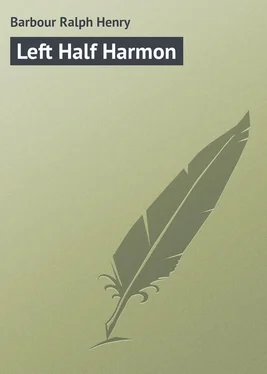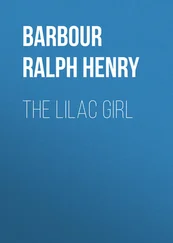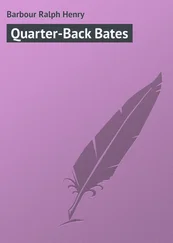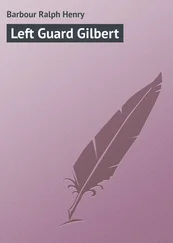Ralph Barbour - Left Half Harmon
Здесь есть возможность читать онлайн «Ralph Barbour - Left Half Harmon» — ознакомительный отрывок электронной книги совершенно бесплатно, а после прочтения отрывка купить полную версию. В некоторых случаях можно слушать аудио, скачать через торрент в формате fb2 и присутствует краткое содержание. Жанр: foreign_prose, foreign_children, на английском языке. Описание произведения, (предисловие) а так же отзывы посетителей доступны на портале библиотеки ЛибКат.
- Название:Left Half Harmon
- Автор:
- Жанр:
- Год:неизвестен
- ISBN:нет данных
- Рейтинг книги:3 / 5. Голосов: 1
-
Избранное:Добавить в избранное
- Отзывы:
-
Ваша оценка:
- 60
- 1
- 2
- 3
- 4
- 5
Left Half Harmon: краткое содержание, описание и аннотация
Предлагаем к чтению аннотацию, описание, краткое содержание или предисловие (зависит от того, что написал сам автор книги «Left Half Harmon»). Если вы не нашли необходимую информацию о книге — напишите в комментариях, мы постараемся отыскать её.
Left Half Harmon — читать онлайн ознакомительный отрывок
Ниже представлен текст книги, разбитый по страницам. Система сохранения места последней прочитанной страницы, позволяет с удобством читать онлайн бесплатно книгу «Left Half Harmon», без необходимости каждый раз заново искать на чём Вы остановились. Поставьте закладку, и сможете в любой момент перейти на страницу, на которой закончили чтение.
Интервал:
Закладка:
The “city,” though, in spite of Willard’s sarcasm, was really a very nice one. Not, of course, that it was more than a town, and a small one at that, but it was clean and well laid out, with plenty of trees, lots of modestly attractive residences and a sufficiency of wide-awake stores. When Willard said he had seen it he was enlarging on the truth, for it was not until the day succeeding the remark that he really had a thorough look at it. Then Martin took him in tow and, since there were few recitations on Saturdays, they spent an hour or more roaming about it. There were two distinct shopping centers in Alton. One lay along Main Street a good half-mile from the Academy, and on the side streets adjacent, and one occupied two blocks on West Street, scarcely more than a long stone-throw from the school. The latter catered almost exclusively to the students, and the latter found few excuses for going further afield to make their purchases. Martin told Willard which of the nearby ice cream parlors had the best soda fountain, showed him which of the stationery stores was most popular, where he could buy haberdashery at fair prices, where to get his shoes shined if such an extravagant proceeding appealed to him, where the best barber shop was – even cautioning him against “the wop at the third chair who would shave your neck if you didn’t watch him” – and, in short, thoroughly initiated him into the mysteries of West Street buying. In school parlance, the locality was “Bagdad,” although the shops were never referred to as “bazaars.”
“You can get tick at any of them,” Martin explained, “but they’ll make it mighty uncomfortable for you if you don’t pay up every half-year, and faculty sort of frowns on running up bills. It’s better to pay cash if you can, Brand. Besides, you can usually jew ’em down if you have the money in your hand. Last spring Stacey Ross bought a suit over there at Girtle’s and they charged it to him at sixty dollars, and a fellow called ‘Poke’ Little went and paid cash for one just like it and got off for forty-seven-fifty. Stacey had a fit and went back and read the riot act. But the old geezer told him that ‘time was money’!” Martin chuckled. “In his case two months’ time was twelve dollars and a half! Stacey got even, though.”
“How?” asked Willard.
“Got a thin fellow named Patterson, a sophomore, to put the suit on and walk up and down the block for an hour one Saturday afternoon. The clothes hung all over Patterson and he looked like a scarecrow, and he carried a placard around his neck that said: ‘This suit was bought at Girtle’s.’ Old Girtle was furious and tried to get Patterson to go away. Offered him ten dollars, Patterson said, but it didn’t sound like Girtle! Anyhow, Patterson kept on walking up and down and about two dozen kids went with him and a lot of the fellows stood around and cheered and we had quite a fine moment! ‘Mac’ had Stacey on the carpet about it, but when Stacey explained Mac only smiled and let him go.”
“Is ‘Mac’ what you call the Principal?” asked Willard.
“Yes, it’s short for ‘Doctor Maitland McPherson.’ Have you met him yet? He’s a good sort, Mac is. There’s a story that some years back there was a wild westerner here from Wyoming or Arkansas or some of those places and he was talking one day in the corridor in Academy and Mac was in one of the classrooms right near, and this fellow – I forget his name; Smith, maybe – called him ‘the old Prince,’ and Mac overheard him and came out. ‘Were you referring to me, Smith?’ he asked. ‘Yes, sir.’ ‘And what was the name you gave me?’ ‘Prince, sir; that’s short for Principal.’ ‘Ah,’ said Mac. ‘Most ingenious! You may go on Hall Restriction one week for “int.”’ ‘Int’ is short for interest.”
Football affairs got straightened out that afternoon and Willard found himself in C Squad with some twenty or so other candidates whose knowledge of football ranged from fair to middling. Only the simpler exercises were indulged in and the hour-and-a-half period stretched out interminably. The day was unseasonably warm and the bored youth who had C Squad in charge was unable to work up much enthusiasm. Willard was heartily glad when the session was over. He presumed that a certain amount of catching and passing was beneficial to him, but he mildly resented spending an hour and a half at it. Joe Myers showed every indication of acceding to Willard’s request that he be allowed to stand on his own feet, for so far Joe had paid no attention to the newcomer during practice. There were times this afternoon when Willard rather wished that he hadn’t been so independent. He would not have resented it a bit had Joe yanked him out of that beginner’s squad and put him where he could have worked with something besides his hands! By five o’clock, when the end came, Willard was sick of the sight and the feel of a football!
That evening, however, when he accompanied Joe and Martin and Bob to the Broadway Theater, the moving picture house patronized by the school, Joe inquired most solicitously about Willard’s progress in practice. He did not, though, seem much concerned when Willard hinted that he was wasting his time learning how to pass a football. “It is dreary work, isn’t it?” said Joe cheerfully. “Well, there won’t be much more of it, Brand. You’ll get into formations next week. By the way, you want to try for half-back, don’t you? Hm. That’s so. Hm. Too bad you’re so light. Ever try playing end?”
Willard answered that he never had, whereupon Joe remarked: “’S ’at so?” in an absent way and said he hoped there’d be a good comedy at the theater!
CHAPTER VII
IN THE COACH’S ROOM
Whether the comedy was good or not, it at least evoked much laughter, and was followed by a thrilling “big picture” that worked Willard to a pitch of excitement that lasted until he was out on State Street again. They ran into Mr. Cade in front of the theater and he fell into step with them as they walked back toward the Green. He and Joe and Bob talked about the show, while Martin and Willard followed behind and listened. At West Street Bob proposed drinks, and they crossed to The Mirror and sat about a tiny table and drank colorful concoctions through paper straws. The coach rather surprised Willard by displaying positive enthusiasm for his tipple, which, as near as Willard could determine, contained a little of everything that could come out of the glistening taps! Willard was a little bit too much in awe of the coach to feel quite at ease, and his contributions to the conversation were few and brief. Not that the talk was very erudite, however, for Bob talked a good deal of nonsense and Mr. Cade certainly didn’t oppress them with a flow of wisdom. On the contrary, he laughed at Bob a good deal and said one or two funny things himself, things at which Willard laughed a bit constrainedly, not being certain that it was right to greet anything a head football coach said with levity. At Schuyler High School the coach had been a most dignified and unapproachable martinet of whom everyone stood in admiring awe!
When they went out Bob leaned carelessly across the counter and instructed the young lady with the enormous puffs over her ears to “put that down to me, please.” Willard, following the others out, reflected that, while trading on a cash basis might be wiser, one missed many fine moments by not having a charge account! (This, perhaps, is a good place to explain that the expression “fine moments” was widely current at Alton that term. Like many other expressions, its origin was a mystery, and, like them, its vogue grew by leaps and bounds until even the freshmen were having their “fine moments” and Mr. Fowler, in English 7, prohibited its use in themes.)
Читать дальшеИнтервал:
Закладка:
Похожие книги на «Left Half Harmon»
Представляем Вашему вниманию похожие книги на «Left Half Harmon» списком для выбора. Мы отобрали схожую по названию и смыслу литературу в надежде предоставить читателям больше вариантов отыскать новые, интересные, ещё непрочитанные произведения.
Обсуждение, отзывы о книге «Left Half Harmon» и просто собственные мнения читателей. Оставьте ваши комментарии, напишите, что Вы думаете о произведении, его смысле или главных героях. Укажите что конкретно понравилось, а что нет, и почему Вы так считаете.












